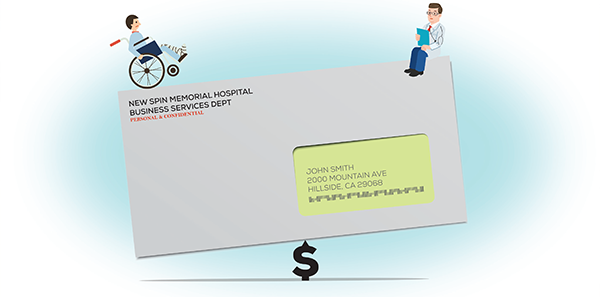
Balance billing is a matter in which emergency physicians have been placed in an indefensible position. While the underlying causes of balance billing disputes are nuanced and complex, the optics of the matter are inarguable: the physician issuing the bill is universally viewed as the “bad guy.” Bad cases make bad law, and it is the bad cases that make headlines. In New York, a surgeon billed a patient $117,000 for his portion of a spinal surgery.1 Emergency physician bills are far more modest but can still easily reach thousands of dollars when lifesaving services or invasive procedures are performed. Lawmakers, understandably outraged over what they see as abusive practices directed toward vulnerable patients, more and more are turning to outright bans on the practice of balance billing. The issue has even received a media-friendly, scary rebranding as “surprise billing.” Legislation restricting or banning this practice has been proposed or passed in New York, California, Washington, Illinois, Colorado, Florida, and more.
Explore This Issue
ACEP Now: Vol 34 – No 11 – November 2015This is a potent threat to emergency physicians; a balance billing ban requires the physician to accept whatever the insurer will pay and no more. This gives the insurer unilateral rate-setting power. Our only negotiating power with carriers comes from the ability to go out of network. When California issued a blanket ban on balance billing, payments to physicians by carriers dropped drastically, by 20 percent overall and up to 33 percent by some payers.2 This revenue loss directly impacts the salaries of emergency physicians.
The hardest thing about losing is to recognize that you are losing. What ACEP, state chapters, and engaged physicians must accept is this: we cannot simply continue to oppose bans on balance billing. If we do, we will lose. Patients are being economically harmed, and though the fault is not ours, the solution must be ours. Emergency physicians are problem solvers by nature. We need to be at the table, proactively, with policy solutions that protect patients while preserving our ability to receive fair payment for services already provided.
The only acceptable solutions are those that will hold the patient harmless and provide a mechanism determining the amount the insurer must pay. With a friendly legislature, one such approach would be to mandate that the carrier must pay the full charges for out-of-network emergency patients. Colorado has passed a law to this effect, and despite fears that it might create an inflationary environment encouraging physicians to raise prices, this has not been observed to date.3
Pages: 1 2 3 | Single Page





2 Responses to “Opinion: Emergency Physicians Should Work On Solutions to Balance Billing Issues”
December 7, 2015
Myles Riner, MDLiam, I agree with your analysis that balance billing, especially when the patient presents to an in-network hospital and is seen by out-of-network emergency and on-call physicians, is ‘an indefensible position’.
The problem with solutions like the one in New York is that it does not eliminate either balance billing or even surprise balance billing, and as such it will continue to generate complaints from patients and resistance from consumer advocates and eventually, calls for regulatory or legislative prohibitions. There should be fewer such surprise balance bills (though the largest bills are the ones that will persist), and this will help, and the law might even encourage plans to offer fair in-network rates. We will have to see how this all plays out in that State, and anywhere else this might be tried.
I will point out, however, that plans are not required to submit all their claims to FAIR Health in the rest of the country, and thus this database is still subject to selective claims submission, which undermined the validity of the Ingenix database. Fair benefits for OON services is a complex issue that is difficult to explain in an elevator speech, and losing this battle may drastically alter the practice of emergency medicine, and undermine access to emergency care for everyone.
December 9, 2015
Bing PaoEmergency services is an essential health benefit, but is not adequately covered by all health plans. Patient should only be responsible for a deductible when seeking emergency care. Patients should not be placed in a situation wondering how must it will cost for a diagnostic study and refusing necessary emergency care. Health plans should be required to have an adequate emergency provider network and contract with all emergency providers that are in the vicinity of the health plan’s enrollees. Likewise,emergency providers should be required to contract with health plans. Unless a fair payment standard can be established, the best solution is for both parties to negotiate a contract on an even playing field. Patients should not be stuck in the middle.
Bing Pao